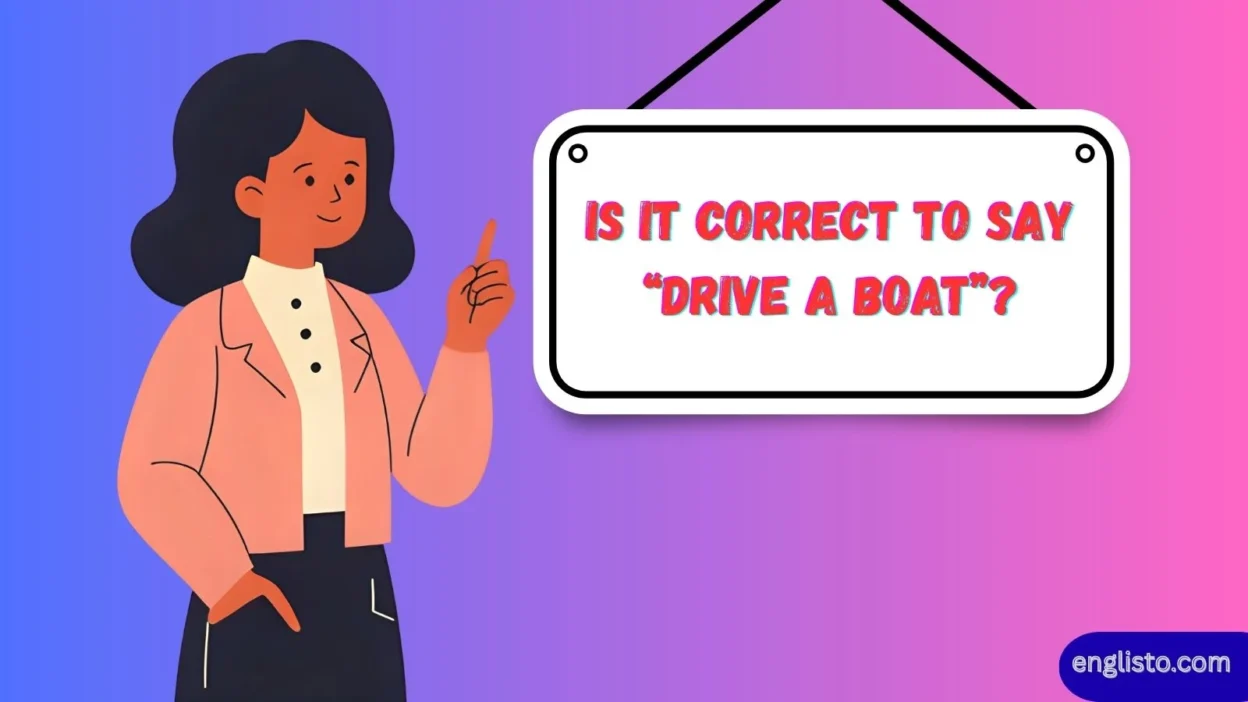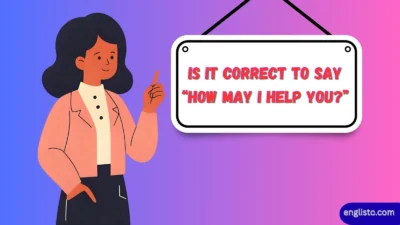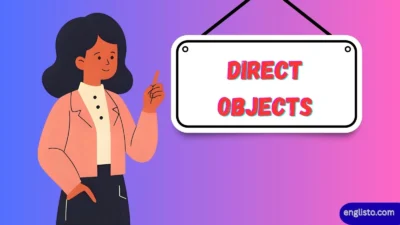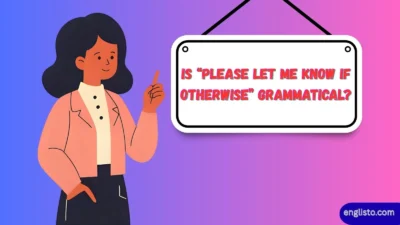Language is full of expressions that sound natural in one context but awkward in another. One of the most common examples is whether it’s correct to say “drive a boat.” While we easily say “drive a car” or “drive a bus,” using the same verb for boats raises eyebrows—especially among seasoned sailors and boating enthusiasts. Is It Correct to Say “Drive a Boat”?.
This guide dives deep into grammar, real-life usage, nautical terminology, and cultural preferences to answer this question once and for all. Along the way, you’ll learn which verbs are appropriate, why context matters, and how history, tradition, and even law have shaped the words we use to describe the act of operating a boat.
Why “Drive a Boat” Sounds Awkward
At first glance, “drive a boat” seems logical. After all, boats with motors do move across water like cars do on land. Yet, native English speakers usually hesitate to use “drive” in this context.
The reason lies in verb choice and tradition:
- Cars, buses, motorcycles, scooters, and trucks are driven because they travel on solid roads and use wheels.
- Boats and ships are more often piloted, steered, captained, or skippered because they move through water, where navigation requires attention to wind, waves, currents, and tides.
In other words, “drive” feels too land-based for seafaring craft.
Common Alternatives to “Drive a Boat”
Different contexts call for different verbs. Here are the most widely accepted choices:
| Verb | When It’s Used | Example Sentence | Tone/Formality |
| Steer | Emphasizing control of the wheel or tiller | “She steered the yacht into the harbor.” | Neutral, technical |
| Pilot | Smaller powered boats, aircraft, or ferries | “He piloted the motorboat down the river.” | Professional, formal |
| Skipper | Acting as captain, especially with a crew | “They skipped the racing yacht across the channel.” | Nautical, informal |
| Operate | Any powered vessel; mechanical emphasis | “You must be licensed to operate a PWC.” | Legal, formal |
| Captain | Taking command or leadership role | “She captained the vessel on its maiden voyage.” | Strong, authoritative |
| Sail | Wind-powered sailboats or yachts | “He learned to sail at the Manhattan Yacht Club.” | Recreational, specific |
Notice that “drive” doesn’t appear as the primary verb.
The Role of Context
Language use often depends on who’s speaking and in what situation.
- Informal speech: You might hear, “We drove the boat around the lake,” especially in North America when people talk about motorboats.
- Formal writing: Manuals, legal documents, and navigation guides avoid “drive” entirely, favoring “operate” or “pilot.”
- Nautical communities: Experienced sailors will almost always prefer “skipper,” “sail,” or “helm.”
So, while you can say “drive a boat” casually, it’s not considered standard or precise in professional or nautical settings.
Historical and Linguistic Roots
Understanding why “drive a boat” feels off requires a look at word history:
- The verb “drive” comes from Old English drīfan, meaning “to force or urge forward.” Originally, it applied to herding animals, wagons, or vehicles on land.
- The verb “pilot” comes from Medieval Greek pedotes (rudder man, from pedon = oar). By the 14th century, “pilot” referred to guiding ships.
- The verb “helm” originates in seafaring traditions, tied directly to the wheel or tiller used to steer.
Over centuries, “drive” became firmly attached to land-based transport, while maritime traditions developed their own lexicon.
Comparing “Drive a Car” vs. “Operate a Boat”
A car and a boat both involve movement, engines, and steering, but the environments differ drastically.
| Feature | Car (Driven) | Boat (Operated/Steered) |
| Surface | Road/land | Water (variable, shifting) |
| Mechanism | Wheels, tires | Rudder, tiller, wheel |
| Influences | Road rules, traffic lights | Wind, current, tides, waves |
| Stopping method | Brakes | Reverse throttle, drag, anchors |
| Common verb | Drive | Steer, pilot, skipper |
| Legal terminology | Driver’s license | Pleasure Craft Operator Card (Canada), boating license (varies by country) |
This explains why different verbs evolved for each.
Everyday Usage Examples
Here’s how native speakers commonly frame their boating experiences:
- “We went out sailing on Saturday.”
- “He’s learning how to skipper a yacht.”
- “I got my license to operate a personal watercraft.”
- “She was at the helm when the storm hit.”
But you might also overhear:
- “We drove the boat across the lake.” (informal, casual, often in North America)
The second group is less common in professional or nautical writing but acceptable in conversational English.
Nautical Nuances: Helm, Skipper, Pilot
In boating, specific terms highlight roles and actions:
- At the helm: Refers to the person steering the wheel or tiller.
- Skippering: Taking responsibility for the entire boat and crew.
- Piloting: Navigating through complex waters, often with charts and maps.
Each carries more precision than “drive.”
Legal and Licensing Considerations
In many countries, the law never uses the phrase “drive a boat.” Instead, you’ll see words like operate, command, or navigate.
- Canada: Requires a Pleasure Craft Operator Card (PCOC) to operate a motorized vessel.
- UK: The Royal Yachting Association trains skippers and helmsmen, not “drivers.”
- US: State boating laws use “operate” consistently.
This reinforces the idea that “drive” is informal and nonstandard.
Cultural Preferences
- North America: Casual speech may allow “drive a boat,” especially for speedboats or small motorboats.
- UK and Commonwealth: More likely to use “sail,” “skipper,” or “helm,” even for motorboats.
- Professional maritime circles: Avoid “drive” altogether.
Much like accents or idioms, preference depends on exposure and tradition.
When “Drive a Boat” Might Be Acceptable
Despite all this, there are moments when “drive” isn’t entirely wrong:
- Talking with children: “Do you want to drive the boat for a bit?”
- Informal social settings: “We drove around the lake all afternoon.”
- Emphasizing the engine-powered nature of the craft: “He drives that speedboat like it’s a sports car.”
Still, these uses are stylistic choices, not grammatically precise ones.
Synonyms and Related Expressions
Here’s a quick look at words and phrases that can replace “drive a boat”:
| Standard Alternatives | Informal/Colloquial | Technical/Professional |
| Steer a boat | Drive a boat (casual) | Helm a vessel |
| Operate a boat | Run the boat | Skipper a craft |
| Navigate a vessel | Take the boat out | Command a ship |
| Sail a yacht | Go boating | Pilot the vessel |
This shows the wide range of options depending on audience and setting.
Practical Grammar Tip
If you’re unsure which verb to use, default to “operate” in formal contexts and “steer” or “sail” in casual, accurate ones. Reserve “drive” for relaxed conversations with friends.
Frequently Asked Questions
Is it wrong to say “drive a boat”?
Not strictly wrong, but it’s informal and uncommon. Use “operate,” “steer,” or “sail” for accuracy.
Do sailors ever use “drive”?
Rarely. Experienced sailors prefer “helm,” “skipper,” or “sail.”
What verb should I use for a speedboat?
“Operate” or “pilot” is safest, though “drive” might slip into casual speech.
What about kayaks or canoes?
You “paddle” or “row” them—not drive.
Why does it matter which verb I use?
Because precise terms show respect for nautical traditions and avoid confusion in legal or safety contexts.
Conclusion
So, is it correct to say “drive a boat”? Technically, yes—you might hear it in casual lakeside conversations or among younger boaters. But in formal, professional, or nautical contexts, it’s better to stick with verbs like operate, pilot, skipper, helm, or sail.
Language is shaped by tradition, environment, and community norms. Just as we drive cars but ride horses, so too do we steer boats and sail ships. The right word choice not only avoids awkwardness but also shows confidence and respect for maritime culture.
When in doubt, leave “driving” for the roads—and let “operating, sailing, or skippering” guide you on the water.



